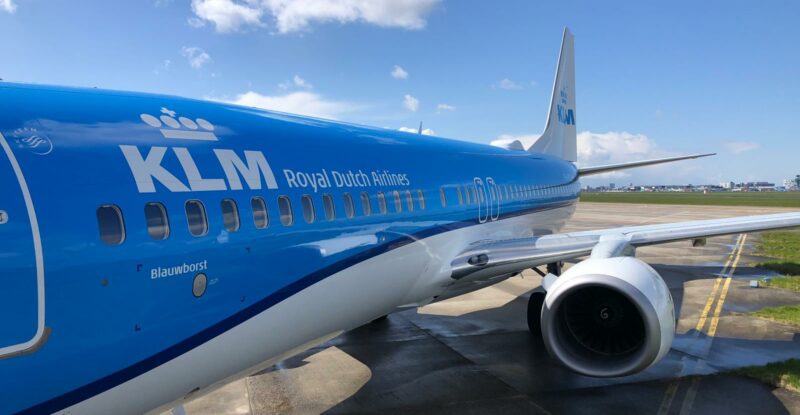 KLM and other airlines are taking legal action against the Dutch government’s proposal to reduce and cap aircraft movements at Amsterdam Schiphol, arguing that the move — which is designed to cut noise and harmful emissions — is “unnecessary”.
KLM and other airlines are taking legal action against the Dutch government’s proposal to reduce and cap aircraft movements at Amsterdam Schiphol, arguing that the move — which is designed to cut noise and harmful emissions — is “unnecessary”.
In June 2022, the Dutch government proposed limiting flights to and from Schiphol to a maximum of 440,000 a year, down from the current capacity of 500,000. The government said at the time that the move aims to “strike a balance between the importance of having a large international airport and of a better, healthier living environment”.
The airport’s operator, Schiphol Group, said earlier this month that it would temporarily cap aircraft movements for the year beginning winter 2023 at 460,000, describing this as a “necessary intermediate step” while the details of the government’s proposal are ironed out. Schiphol Group is calling for a new Airport Traffic Decree containing “hard environmental limits” to be initiated “as soon as possible”, but appears to support the cap.
“The restriction on growth in the volume of flight movements is not an end in itself for Schiphol. The proposed volume restriction is a painful intervention for the airlines, but acceptable for Schiphol,” it says, adding that “the scheme is feasible and workable”.
Airlines, however, take a different view.
In a joint statement issued on 3 March, KLM Group, Delta Air Lines, Corendon, easyJet and TUI announced that they are “challenging the government’s unilateral decision to significantly cut flight movements at Schiphol”. The airlines describe the government’s decision to reduce capacity at Schiphol as “incomprehensible”, arguing that they have “already made multi-billion euro investments to meet near- and long-term goals” on decarbonisation.
IATA is backing the legal action, claiming that the Dutch government’s decision contravenes European Union regulations on noise-related operating restrictions at EU airports, and goes against the Chicago Convention.
“The job-destroying, hostile approach to aviation that the Dutch government has chosen is a totally disproportionate response to managing noise,” says IATA director general Willie Walsh. “The government has even refused to engage in meaningful consultations and made flight reductions the goal, rather than working with industry to meet noise and emissions reduction goals while restoring employment and revitalizing the post-pandemic economy. The dangerous precedent that this illegal approach creates left no choice but to challenge them in court.”
IATA points to the deployment of quieter aircraft, which it says has reduced noise levels by 50% in the last decade, as well as the aviation industry’s commitment to reduce its carbon-dioxide emissions to net zero by 2050 through a number of measures, including greater use of sustainable aviation fuels and the development of hydrogen-powered aircraft.
However, scientists in the UK last month called into question whether the aviation industry’s decarbonization goals are achievable. In a report published on 28 February by the Royal Society, scientists warn that producing enough sustainable aviation fuel to support the UK’s net-zero ambitions would require “enormous quantities of UK agricultural land or renewable electricity to keep flying at today’s levels”.
According to the report, meeting existing UK aviation demand entirely with energy crops would require “around half of UK agricultural land”, while producing sufficient green hydrogen fuel would require 2.4-3.4 times the UK’s 2020 renewable electricity generation.
“While each fuel type has advantages and drawbacks, the findings underscore the challenges of decarbonizing aviation, especially when resources are likely to be in global demand for a range of net-zero objectives,” says the Royal Society.
Environmental campaigners have long argued that the number of flights should be curbed to address the aviation industry’s carbon footprint.
“The elephant in the room here is, of course, the need to fly less,” says Cait Hewitt, policy director at the Aviation Environment Federation. “While it’s right for the aviation industry to be progressing rapidly with research and development for zero-emission flight, as [the Royal Society’s] report shows, there will be no easy answers, and none that are able to deliver green flights any time soon.”
Related Articles:
- Regional flights powered by hydrogen edge closer to launch
- Exploring Italian intermodality with Lufthansa and ITA
- A350 testbed demos ‘most energy efficient flight’ in advance of 4D
- Aviation industry starts to pour money into carbon removal tech
- Airline SAF pledges pick up pace ahead of COP27 climate summit
- Aviation stakeholders propose cabin changes to improve sustainability
- Report criticizes UK Jet Zero for failure to restrict flight demand
Featured image credited to KLM











